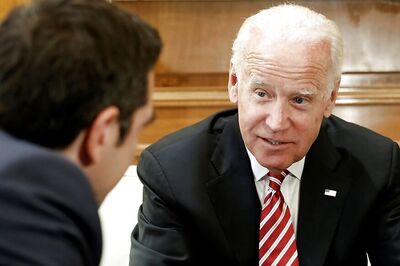
views
Islamabad: A Pakistani anti-terrorism court on Tuesday ordered the Federal Investigation Agency to include former military ruler Pervez Musharraf, a "proclaimed offender", in the probe into the assassination of ex-prime minister Benazir Bhutto in 2007. Musharraf appeared before Judge Chaudhry Habib-ur-Rehman for the first time since the Rawalpindi-based court began hearing the case in 2008.
His lawyer asked the judge to withdraw orders declaring Musharraf a fugitive and freezing his bank accounts and assets.
The anti-terrorism court, which conducted the hearing behind closed doors for security reasons, had declared Musharraf a "proclaimed offender" or fugitive and frozen his assets in 2011 after he failed to cooperate with investigators. The former army chief's lawyer said these orders should be withdrawn as he was now appearing in the anti-terrorism court.
Musharraf was driven to the Rawalpindi-based court from his plush villa on the outskirts of Islamabad which was declared a "sub-jail" last week after he was remanded to judicial custody for a fortnight for charges dating back to his 9-year rule.
Musharraf, 69, was accused of providing inadequate security to Bhutto after she returned to Pakistan from self-exile in late 2007. Bhutto was assassinated in a gun-and-bomb attack shortly after she addressed an election rally at Liaquat Bagh in Rawalpindi on December 27, 2007.
The judge directed Musharraf to cooperate with investigators and adjourned the case till May 3. He also directed the FIA to complete its investigation and submit a 'challan' or chargesheet in court. Musharraf's counsel argued that Bhutto was murdered in 2007 while the former President was implicated in the case on "political basis" when he was abroad.
He further argued that Musharraf was innocent and had nothing to do with the murder. Chief prosecutor Chaudhry Zulfiqar Ali of the FIA told reporters that Musharraf had not cooperated with investigators. "While he was on bail for a month, he did not join the investigation. Today was the first time he appeared in the court," he said.
After the hearing, Musharraf was driven back to his farmhouse amidst tight security. Outside the anti-terrorism court, scores of lawyers scuffled with a large group of Musharraf's supporters. The lawyers beat the former dictator's supporters with sticks and damaged several cars.
Footage on television showed both groups lobbing stones at each other on a street outside the court complex. Four persons were injured and traffic in the area was held up for about half an hour. In a separate development, the Supreme Court resumed hearing five identical petitions seeking Musharraf's trial for treason for imposing emergency rule in 2007.
Ahmad Raza Kasuri, the head of Musharraf's legal team, told the apex court his client had no faith in the bench hearing the treason case. "My client has no faith in the bench hearing the case," Kasuri said. The Supreme Court should first address the issue of forming a larger bench or handing over the case to the full court.
Ibrahim Satti, another of Musharraf's lawyers, said his client's name should be removed from the Exit Control List, which has names of people barred from travelling out of Pakistan. Satti claimed the charge of treason was yet to be proved and adding Musharraf's name to the Exit Control List was a violation of his fundamental rights.
Justice Khilji Arif Hussain, a member of the bench, said Musharraf should apply to the court if he wants to travel abroad. Pakistan's interim government, formed last month to conduct the May 11 general election, informed the Supreme Court on Monday that it would not file treason charges against Musharraf.
In a reply submitted to the court, it said such a move was not part of its mandate. The caretaker administration said a decision on filing treason charges against Musharraf should be left to the winner of the election.
Musharraf was arrested last week after the Islamabad High Court revoked his bail in a case related to the detention of over 60 judges during the 2007 emergency. He returned to Pakistan last month after nearly four years of self-exile, promising to "save" the country from economic ruin and militancy.
However, he was barred from running in the May 11 general election, which will mark the first democratic transition of power in Pakistan's history.


















Comments
0 comment